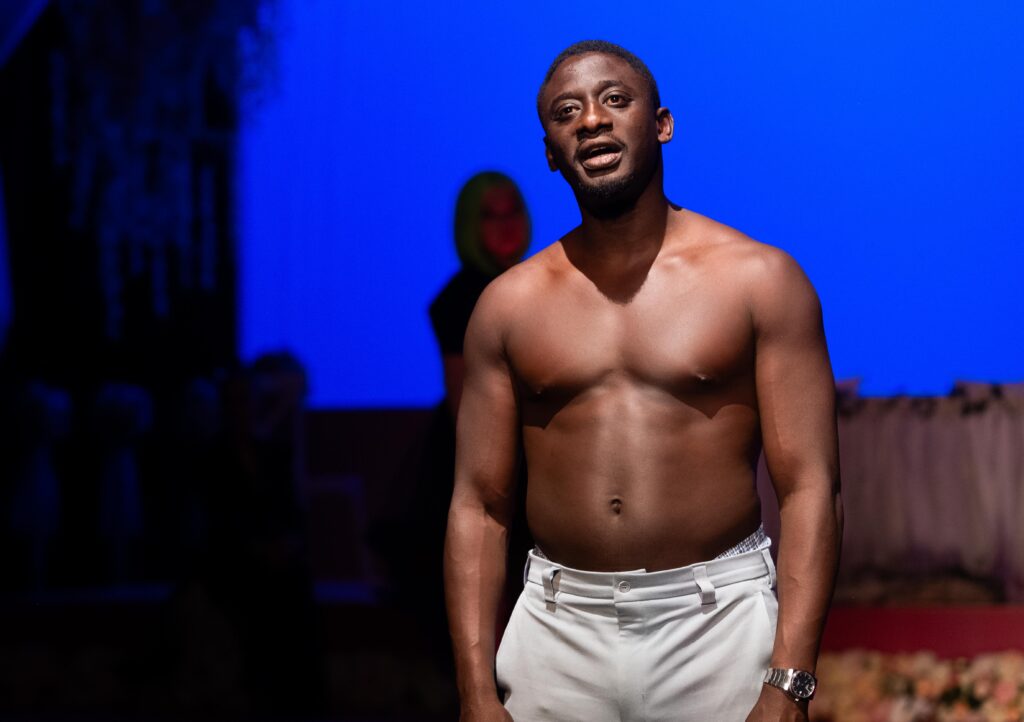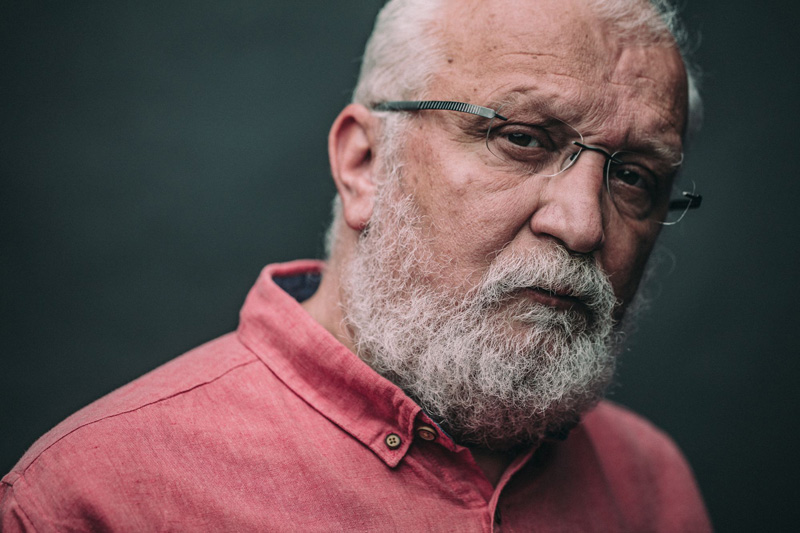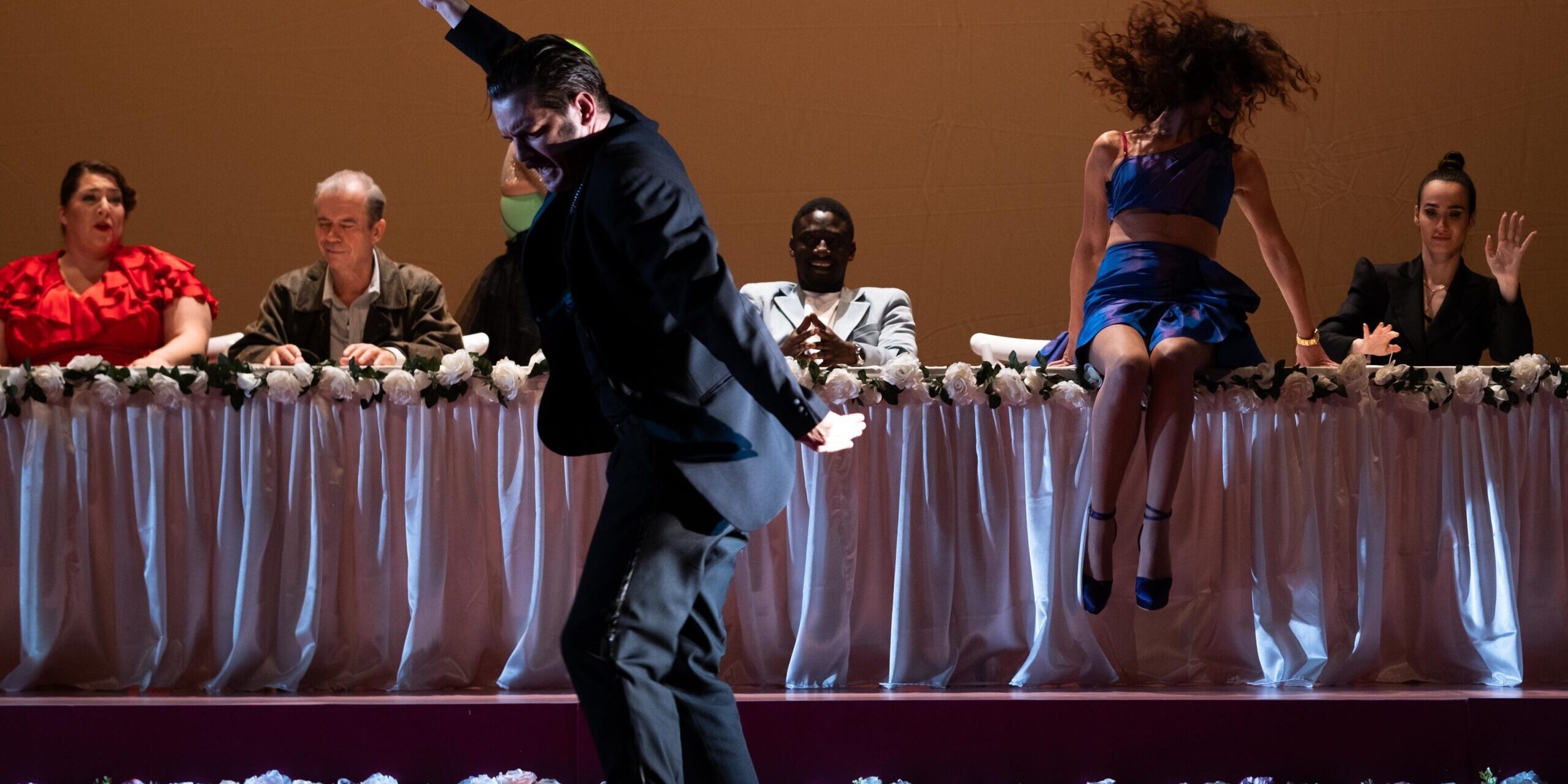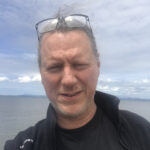The Best European Show is a satire of the politics of European theatre inspired by the Eurovision Song Contest. Nick Awde talks to director Haris Pašović about his new international coproduction performed by actors from eight nations.
Spoiler ahead! The pan-European theatre festival competition does not exist – except in the imagination of The Best European Show, which invites us to imagine how music’s Eurovision model might lend itself to the flavour-of-the-month geopolitics of voting in a winner for theatre – and maybe a nul points loser too.
The show follows the festival jury as they deliberate the merits of the final entries while things collapse into chaos around them – personal rivalries erupt, artistic visions clash, the public riots outside, threatening to storm the theatre. It’s an obvious satirical vehicle, but the idea of 52 nations vying for the Best European Show Award flips it into a gloriously self-referential celebration performed in English by actors from eight nations, an in-joke that carefully sets the scene for theatre throwing up a mirror to theatre throwing up a mirror to society.
“What I really like is that the show manages to be ambitious and also spontaneous on so many levels,” says director Haris Pašović. “It all started as as a joke two years ago when I worked with Norbert Rakowski, the director of Poland’s JK Opole Theatre, as members on the international jury of 2022’s Borštnikovo srečanje/Maribor Theatre Festival. When you’re on a jury, it’s a lot of work but you also have a lot of free time where you hang out with the other jury members. We started making up jokes about what might have happened in the international jury and the rest of the festival. It was like we were competing to see who could come up with ever more bizarre jokes about it. At a certain moment, I said, ‘okay Norbert we have to make a show about this.’ And he said, ‘yes and it should be called Judges.’ So we were self-ironic right from the beginning.”
Six months after the festival, Rakowski called Pašović to say that they really should do the show, and the in-joke evolved into a fully fledged project with Pašović co-writing with playwright/dramaturg Marko Bratuš in collaboration with director/dramaturg Sean Buhagiar as language editor. With Bratuš and Buhagiar also artistic directors of Slovene National Theatre Nova Gorica and Teatru Malta respectively, they joined their theatres into the mix with JK Opole along with Fondazione Teatro Due Parma and National Theatre of Kosovo. Usually a group of co-producers from different nations join forces in order to apply for the sort of Creative Europe funding programmes, but interestingly this was not the case for these five theatres, who chose to directly invest their own money, saving time and creating a more manageable timeline to get the show on stage (note though that the partners are members of the EU-funded European Theatre Convention which supported their first meeting).

The Best European Show. Photos: Edgar de Poy
“It’s a true European collaboration,” says Pašović, “which is not to say that say Creative Europe productions are not European collaborations, but here is a group that has come together not for the sake of applying for funds but because they just wanted to do it – and I really appreciate that. I had the castings in all their countries and travelled around to select the actors and we started rehearsals at the JK Opole in August in one of the most beautiful theatre buildings in Europe.
“What made us love this idea from the start is that it’s about theatre in Europe but it’s also about Europe. We aim to take a reality check of where we are today – we have so many theatres in Europe, so many artists and shows, but we don’t quite have the feeling that theatre is vigorous. I believe it should be – I created theatre in the early 90s during the siege of Sarajevo so that tells you what my bar is when it comes to theatre.”
So how do audiences come in for the laughs and leave with the message? “If you think about it, today’s reality is much more absurd than what you see on the stages. Even five years ago if you put on a play where an American president was fighting with a Swedish teenager on Twitter, it would sound completely absurd. But it actually happened. Reality is faster and and crazier than than theatre is today.”
The European theatre competition is a potent device if only for the fact that it challenges the reality that there is no pan-European theatre festival. In fact there are very few pan-European events outside of sport, and the only cultural event in Europe that truly involves all nations from the EU and beyond is the much loved/maligned Eurovision Song Contest. The finals take place (obviously) in Brussels, more precisely at the cheekily named Union Theatre, and the riot outside is sparked by the Radical Audience Warriors who declare the shows are neither good nor radical enough. Throw in the imminent arrest for corruption of the president of the organising body, the European Parliament, and it soon appears that all that is rotten in the state of Europe has converged on that fateful night. Given such comic allegorical framing, positing the problem is a no-brainer, but suggesting the solution seems less so.
“It would be too ambitious, too pretentious to come up with the solutions for all of Europe’s problems in one play,” laughs Pašović. “But because we believe in strong engagement in the arts, especially theatre, when it comes to the artists it has to be all about the protection of freedoms and democracy. So that’s the solution.”
Each act of creating theatre can be a unique act of resistance in an art form that is dependent on the two-way contact created face to face between performance and audience. “Special circumstances like the siege of Sarajevo, the Warsaw ghetto or the siege of Leningrad are moments in history that keep proving this. Above all, it is the audience that proves the point because, like in Sarajevo, we could have produced the shows in any case but if there was no audience to come, it wouldn’t make any sense. The audience literally risked their lives to come to see the shows. That’s something which we as the artist must respect, it’s our duty because it’s our job to tell the truth and to represent all these voices from our audiences.”
It’s a duty that, with depressing regularity, our theatres do not always observe, a situation that The Best European Show challenges. “Theatre is everywhere over the world, created by people who live in different circumstances and they keep on producing theatre. I have friends in Ukraine, Russia, Israel and Palestine today who are obviously desperate and yet they want to keep creating. Because theatre is a live art, it will survive.”
At the other end of the scale, that duty is being backed by The Best European Show’s five producers. “They aren’t defined by coming from big theatres in big capitals, they don’t come from Berlin, the theatres of London or Paris. They come from Opole, a small town in Poland with a strong theatrical tradition, Parma has a wonderful theatre but it’s not neither Rome nor Milan, and the theatres of Slovenia, Kosovo and Malta are in the capitals of small countries. They are building a way to make modern theatre connect with the rest of Europe, so that everyone can see that big stage theatre is not happening only in the big European capitals.”
It’s one of the steps being made across a European theatre scene that is busy making this new wave of ‘redistribution’ happen. Building on the models of theatres such as NTGent and Qendra Multimedia, it’s a levelling-up that addresses Western Europe’s tendency to consider its theatre as the only real theatre, with Eastern European theatre holding mere secondary importance. It’s a perception that needs to be changed, says Pašović.
“We have so many Western theatres coming to Eastern Europe and the Balkans to perform but it’s rare that theatres from the south east play in the west. I include Greece, Bulgaria and Romania in our region, so it’s literally about west and east, north and south. Then if we talk about the UK, we have to take it as a completely different region in addition to the others. But that’s another story… what I can say is that in The Best European Show one of the potential winners is a show from the UK called Sick Man of Europe. So we are democratically ironic towards everybody.”
For all the imbalance in movement across the continent’s theatres and festivals, the profile of Balkan theatre makers is a high one pretty much everywhere. There exists an X factor clearly, and Pašović explains that this hasn’t come out of nowhere: “In the Balkans we still have this tradition, like in Eastern Europe, where theatre is taken seriously, and our schools are really strong. In the UK, for example, they have fantastic schools for acting but not so much for directing. We have them for both acting and directing.”

Haris Pasovic. Photo: Primoz Korosec
Pašović himself teaches directing for theatre and films at the Academy of Performing Arts Sarajevo (he is also artistic director at independent producer East West Centre Sarajevo), where, he wryly observes, his students turn out to be more successful on the film side. Regardless, both sets have gone on to win more than 300 international film awards, including Oscars and Oscar nominations, BAFTAs, Césars and Berlins. “But when it comes to our institutions, Balkan theatre then becomes very sluggish, old-style and conservative, and in many ways dependent on politics. So all this brilliant talent from our schools of excellence somehow disappears within the reality of institutional theatre.”
It is a malaise that the rest of European theatre shares. From the Balkans to the UK, from Sweden to Malta, in most cases the road taken is one of an extreme middle order, says Pašović. “To be candid, it’s not brave enough, it’s not challenging enough. We talk about these issues in the show, from Brexit to the climate crisis, feminism to war in Ukraine, LGBT to racism and abortion, killing of journalists to corruption and drugs. In this show we take all these issues seriously and that gets the audience immersed. They’re so focused that in the end they give us standing ovations and say, ‘we don’t hear this from our stages’. So the audience are open. In Poland we played on the weekend of the general elections there – you can imagine how how the atmosphere was, at the highest level.”
It’s not a popular act to criticise artists but artists should be self-critical, always checking and resetting where their responsibilities lie. It’s not enough to post on Facebook or Twitter support for Ukraine, for example. “It’s actually nothing,” adds Pašović, “so what is our responsibility? We have to ask what have we done in theatre and what haven’t we done to make this world better?”
That’s a worthy roadmap for practitioners, but to come back again to the other partner in thaetre, the audience, how are they to take this challenge? “The audience for theatre in Europe is extremely varied. I am sometimes shocked when I meet people who travel from one city to another to see theatre. You meet young people and old people at the same show. The fact is that theatres are full for the good shows. It’s clear that you need to have some kind of attraction that works, and of course not every show has that, but theatres today like our five co-producers are working hard to develop their audiences.
“Our audiences have so many opportunities to watch different stuff from YouTube and Netflix to playing video games. We have to bear in mind that seeing theatre today is an investment that involves logistics to organise your life in order to spend three hours with a group of other people, and it’s not always inexpensive.
“So I admire each of these spectators who come and give us their time and their trust, which is why I feel the responsibility to give them a real experience and that they should expect it. The key word is ‘experience’ because people want a live experience where they share energies and ideas, where they find themselves in dialogue with the play and are entertained at the same time. Theatre is ritual, it is serious, it is educational, but I never forget that it is also entertainment. And we have to give them all of this.”
For more information, visit: teatropole.pl
Further reading: interview with Haris Pašović: “Europe today is a Europe of inequality”
Nick Awde is a journalist, playwright, editor, critic and producer. Based in the UK, he is co-director of Morecambe's Alhambra Theatre. Books include Equal Stages (diversity and inclusion in theatre), Mellotron, Women In Islam, and translations of plays by other writers. Much of his work focuses on ethnoconflict and language/cultural genocide.








